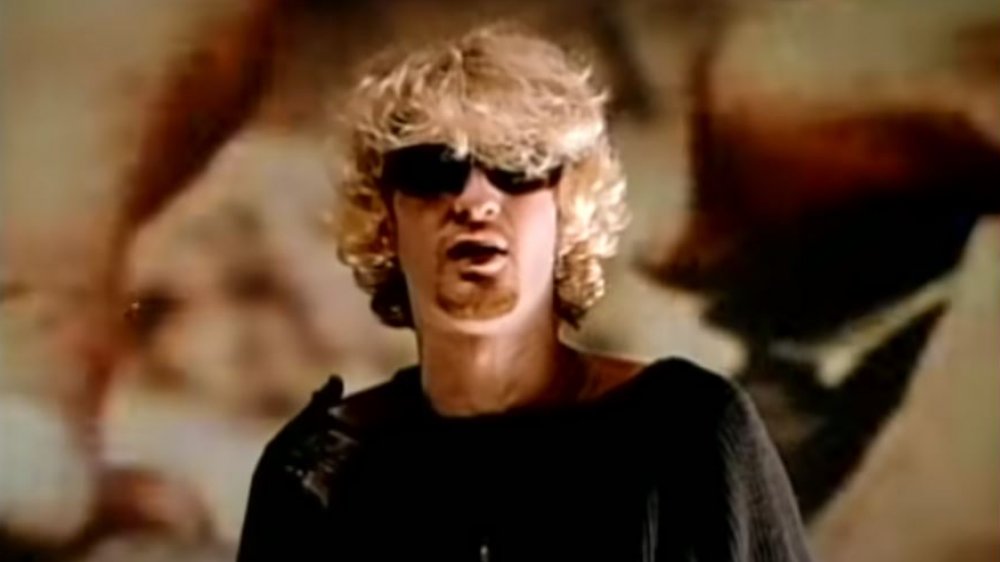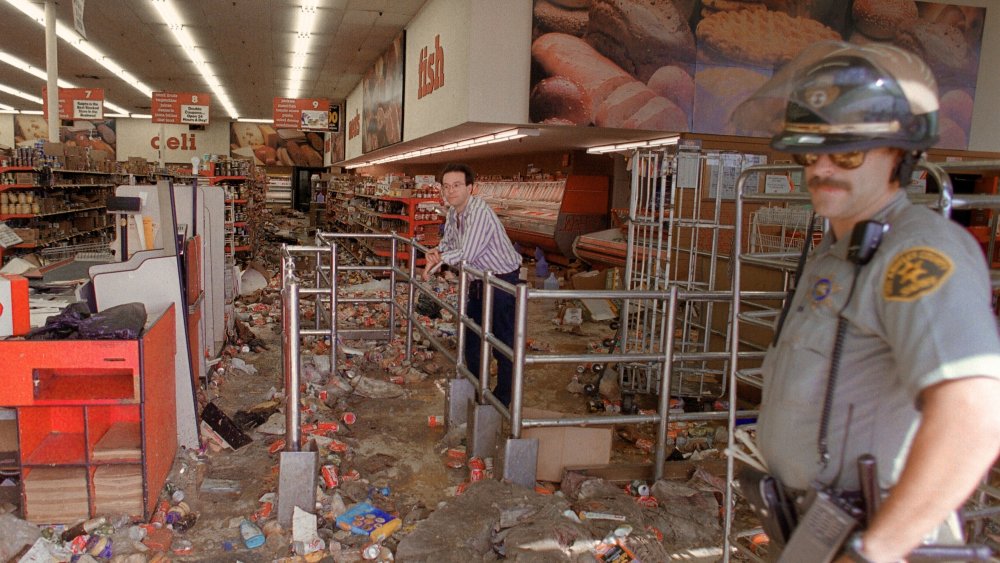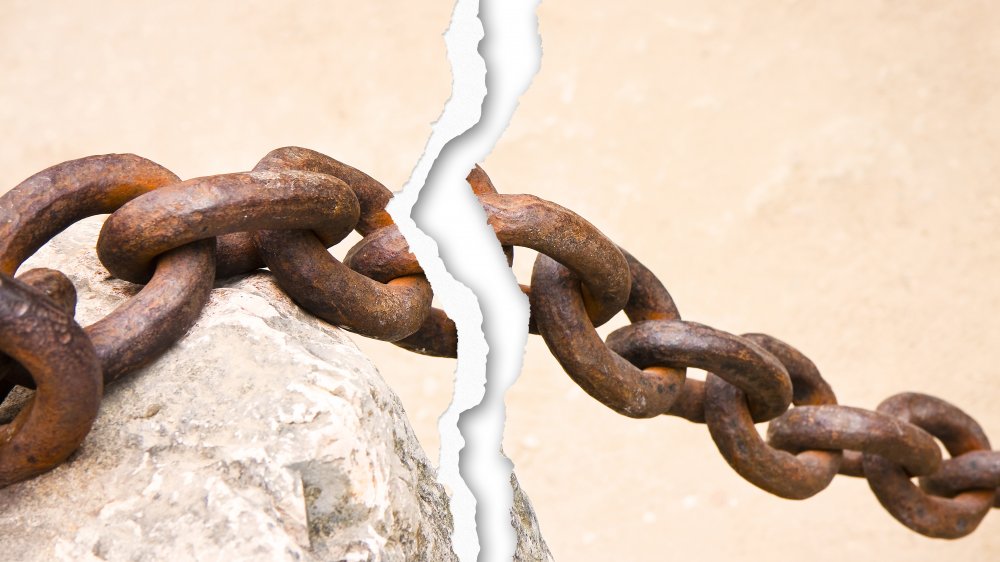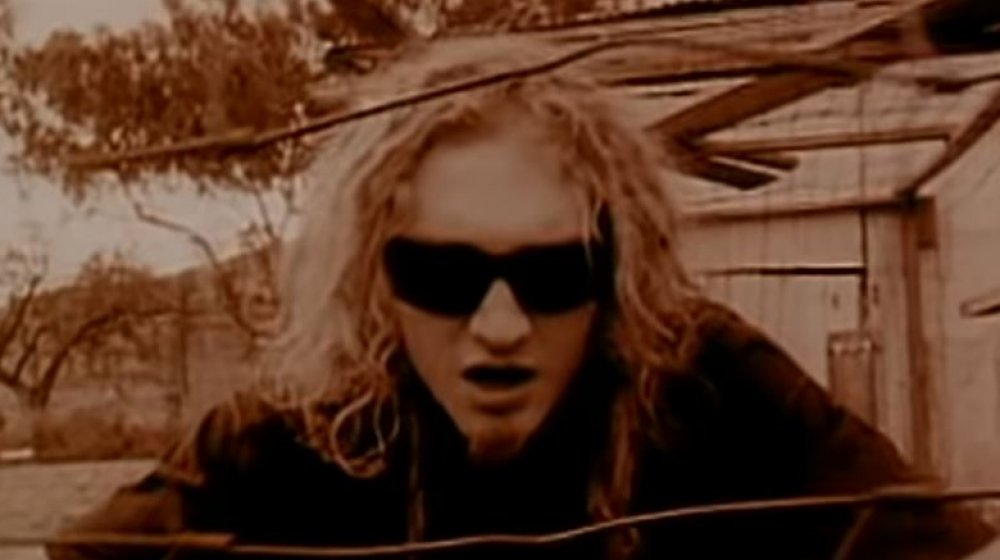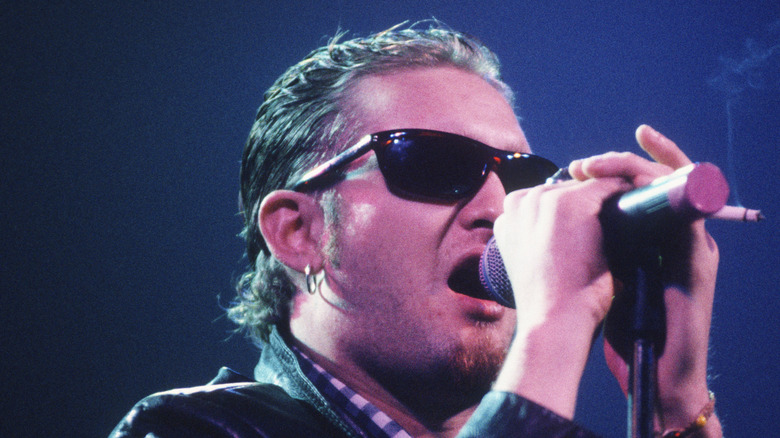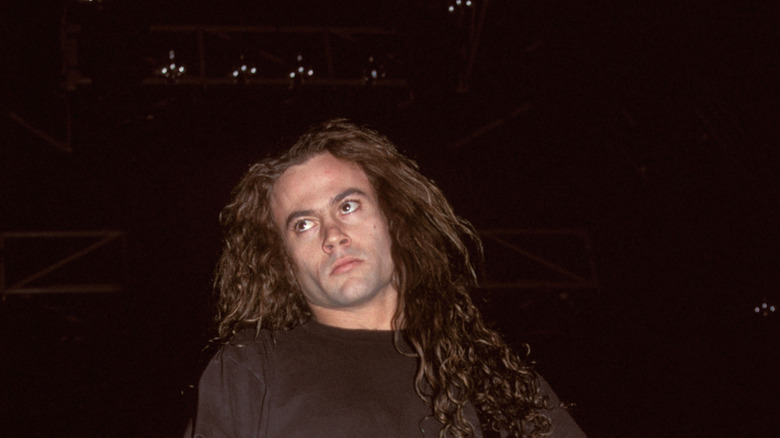The Tragic Real-Life Story Of Alice In Chains
Nirvana might have been the biggest name in grunge, Pearl Jam the most enduring, and Soundgarden the most hard-hitting, but as Stephen Hill of Louder tells us, it was Alice in Chains that first brought the genre into the mainstream with their sublime 1990 debut album, "Facelift." Armed with a brand new sound that incorporated elements from heavy metal to the famous grunge drop-D tuning, the twin vocals of guitarist Jerry Cantrell and charismatic frontman Layne Staley, and the album's most iconic single, "Man in The Box," the band were instrumental in grunge's breakthrough. With their follow-up album, "Dirt," Alice in Chains proved that they were far from a one-trick pony, and singles like "Would?," "Rooster," and "Them Bones" propelled them to further success.
But it wasn't always easy. Despite their considerable fame and fortune, the band have more than their share of disasters thanks to an array of drama, unfortunate incidents, and rock star excess. Today, we'll take a look at the tragic real-life story of Alice in Chains.
Jerry Cantrell lost his mother and grandmother
As the songwriter, guitarist, and co-vocalist, Jerry Cantrell is responsible for much that makes Alice in Chains great. And seeing as the band's musical vibe tends to skew toward despair, it's no surprise that Cantrell has his share of personal tragedies. As James Hickie of Kerrang! tells us, one of the biggest blows came when Cantrell was only 21 — he lost his mother and grandmother over a short period of time. "Those losses really tilted my horizon," Cantrell says. "My whole f****** life was basically taken away from me within the period of a year, and I felt like I was on my own."
Cantrell notes in Mark Yarn's "Everybody Loves Our Town: A History of Grunge" that he was living with the two women at the time, and when he was still dealing with the gut punch that was his grandmother's death, his mother informed him that she had mere months to live. Cantrell's mother was only 43 when she died of pancreatic cancer. In Greg Prato's book, "Grunge Is Dead: The Oral History of Seattle Rock Music," Cantrell says that the losses happened within a span of six months or so, leading him to a situation where he had no immediate family (apparently, at that point his dad didn't count). As a very minor silver lining, his mother's insurance policy left him enough money to buy some music gear and "exist on for a while."
Jerry Cantrell's father issues
Alice In Chains' guitarist and co-vocalist Jerry Cantrell may not have lived quite as rough a life as the band's famously tragic frontman, Layne Staley, but that doesn't mean he hasn't experienced his own share of past awfulness. In particular, the aspiring rock star's relationship with his father was a difficult one. Cantrell lost both his mother and grandmother at a relatively early age, and his relationship with his father was extremely strained due to the fact that Cantrell Sr. had his share of psychological issues from his time in the Vietnam War. This, as Cantrell puts it in an interview with Rolling Stone, caused "a lot of problems and occurrences," which ultimately played a part in breaking up the family, leaving Cantrell and his father estranged.
Fortunately, the Cantrells eventually managed to grow closer after the guitarist was inspired to write a song about his father's experiences in Vietnam. He named the brooding, dark song "Rooster" after his dad's old nickname, and Cantrell Sr. was so fond of the end result that he agreed to appear in the music video. "My father had never talked about that time in his life, and was reluctant to do so if anyone ever asked," Cantrell recalled to Louder. "So I was amazed that he agreed to do Mark's request, for about an hour, on film."
Layne Staley's tragic loss
Alice in Chains frontman Layne Staley lived a life that was full of tragedy and doom, but as The A.V. Club tells us, the people close to the singer appear to think that a very specific point in time marked the start of his darkness. In October 1996, Staley was deeply shocked by the death of Demri Parrott, the vocalist's long-time girlfriend, who also had substance abuse issues. The couple was already separated at that point, and while Staley had plenty of rock star money to finance his habits, Parrott's lower funds forced her to ultimately sell her body in order to pay for her drug use.
Parrott's addiction resulted in fatal bacterial endocarditis, and Staley took the news of her passing extremely hard. In fact, those who knew him said that he "more or less died in spirit" when Parrott did. Staley himself went on to explore dark paths that ultimately culminated in his death, as well.
Layne Staley's hermit years
Layne Staley was a charismatic frontman with a golden voice, but according to The A.V. Club, the year 1996 marked a point when he turned his back to all of it. Like, literally all of it, except for drugs. Staley distanced himself from his band and the world in general, opting instead to taking copious amounts of narcotics and playing video games. Over time, this less-than-healthy lifestyle started taking a toll on the singer, who continued these habits despite his bandmates making numerous attempts to lure him back to the land of the living. Alice in Chains drummer Sean Kinney, in particular, attempted to contact Staley three times a week for years, but Staley refused to even talk to him.
Rumors about the vocalist's condition started making rounds, and some said he'd even lost an arm to gangrene. On the few occasions when Staley emerged from his self-imposed exile where drug dealers left illegal substances at his doorstep, he indeed resembled a shambling, grey zombie who'd even lost one or two fingers from collapsing veins (one of the many rock stars who are missing body parts). Speaking to Greg Prato for his book "Grunge Is Dead: The Oral History Of Seattle Rock Music," journalist Jeff Gilbert said the singer generally looked "like an 80-year-old version of himself."
The difficult Dirt album cycle
Alice in Chains' sophomore studio album, 1992's "Dirt," was a massive success that cemented the band's place in the grunge pantheon and featured landmark hits like "Angry Chair," "Would?," and "Rooster." However, the making of the album was somehow an even darker process than the notoriously gloomy end result. As Rolling Stone writes, the "Dirt" sessions were seemingly cursed by misfortune and were even interrupted by the 1992 Los Angeles riots. The mayhem got so bad that assorted members of the band found it better to flee LA for Tijuana and Joshua Tree.
According to Revolver, things weren't much better when they were in the studio. The band was struggling with the newfound success of their first album, "Facelift," and singer Layne Staley and bass player Mike Starr in particular were turning to drugs to the point that it became a big issue. Staley was so out of it that he had to wear sunglasses when they shot the music video for "Rooster" so viewers wouldn't realize how high he was, while Starr's drug problems became so bad that the band had to ultimately fire him. Oh, and Staley even broke his foot shortly before they started touring the album as a warm-up act for the infamous Ozzy Osbourne, so he had to perform several dates in a wheelchair (more on that later).
Alice in Chains breaks up
It might seem like Alice In Chains ended their existence in a tragic way when singer Layne Staley died, only to later rise from the ashes as a sort of 2.0 version of themselves with the advent of guitarist-singer William DuVall. According to Revolver, however, the band had started cracking at the seams well before Staley passed away, to the point that they even went their separate ways for quite a while. The band had their last full tour with Staley in 1993, when they were co-headlining Lollapalooza. In 1994, they were set to tour with metal legends Metallica, but they ended up canceling just before the first dates. The reason? Staley's heroin addiction.
Staley had recently gone to rehab, but soon afterwards, he showed up in a band rehearsal under influence. As Jon Wiederhorn of Rolling Stone writes, the rest of the band were less than pleased, to the point that drummer Sean Kinney swore he'd never play with Staley again. Guitarist Jerry Cantrell agreed with the sentiment, and just like that, Alice in Chains was on a break. They managed to patch things up six months later, but unfortunately, there was more awfulness on the horizon.
Sean Kinney's broken hand almost prevented him from playing on their debut album
Alice in Chains drummer Sean Kinney's tenure with the band has been comparatively tragedy-free, though as Jon Wiederhorn of Rolling Stone tells us, he did have his own alcohol use issues during the Layne Staley years. And as Loudwire reported, there was a time when the drummer's very presence on the band's first studio album, "Facelift," was at risk.
As bad luck would have it, Kinney broke his hand before the band was due in the studio, and Greg Gilmore, the drummer of Mother Love Bone, sat in to take care of that side of things. Fortunately for Kinney, the producer, Dave Jerden, didn't feel that Gilmore could capture the Alice in Chains drum sound, so the band took a little while off ... but not enough for Kinney's hand to heal. Eventually, he decided that he couldn't miss the band's big break, so he cut off his cast and drummed on the album with a broken hand, cooling it with a bucket of ice he kept beside his drum kit. Truly, art is suffering.
Layne Staley played peak Alice in Chains shows while severely injured
Layne Staley appeared to have a steadfast rule and hearty work ethic. He refused to ever miss a scheduled show, despite the health impact of his drug use and mental health issues. During Alice in Chains' initial period of popularity during the early 1990s grunge movement, Staley even took the stage despite a devastating injury that otherwise prevented him from walking.
In September 1992, Alice in Chains was among the bands booked to play the Oklahoma State Fair. The musician had some time to kill before the show, and he traversed the Oklahoma City fairgrounds with a recreational vehicle. The fun was all over when the man whose band had just released the single "Them Bones" broke some bones in his foot after running over the appendage with that sport vehicle. Staley didn't miss the concert, nor any subsequent tour dates. "I didn't break my neck, so there's no excuse not to play," he explained in 1992, according to Ultimate Guitar. Instead, he performed with the aid of crutches and a wheelchair, and he had a couch on stage where he could rest when necessary.
Jerry Cantrell's repetitive motion injury
In an interview with the Los Angeles Times, Jerry Cantrell recalled that the road to their fifth studio album, 2013's "The Devil Put Dinosaurs Here," was a painful one for him. The guitar maestro developed a repetitive motion injury and had to have surgery to fix the issue. According to Revolver, the band had started working on the album soon after wrapping up their previous tour. However, after recording just one song, Cantrell started experiencing excruciating pain in his arm, which he described feeling "like an icepick in your joint."
It turned out that the guitarist was suffering from a cartilage injury he had been sporting since 2005. Years of intensive guitar heroics had worn down the glenoid labrum in his shoulder socket in a similar way that sometimes happens to baseball pitchers, leaving the bones to essentially grind on each other with painful results. The injury and the ensuing surgical procedure set the musician (and the entire band) back several months. Still, Cantrell ultimately came to see a silver lining in the painful situation, as it forced him and the rest of the band to recharge their batteries before jumping right into a labor-intensive album cycle.
Multiple disasters led to Layne Staley's retirement
Despite releasing the chart-topping EP "Jar of Flies" in 1994 and a self-titled album in 1995, Alice in Chains went on a performance hiatus from around 1994 until 1996, when they booked an appearance on the acoustic concert series "MTV Unplugged." By the time Alice in Chains taped its episode, Layne Staley's heroin addiction had taken a physical toll, to the point where his performance suffered. "We did the 'Unplugged' in New York and Layne kept f****** up 'Sludge Factory,'" guitarist Jerry Cantrell recalled during a 2018 solo concert (via Alternative Nation). "Sludge Factory" was one of Alice in Chains' newest songs, but Staley couldn't get the lyrics out correctly, requiring multiple takes and re-sets, all of which were edited out of the final broadcast. "We did it like eight times, he blew the same thing in the second verse" Cantrell said. Staley can be heard quietly uttering a profanity in the version of "Sludge Factory" that MTV used — evidence that he never did quite nail the song.
"MTV Unplugged" was supposed to be the unofficial start to an Alice in Chains tour. The band had accepted an offer to open for Kiss, following Stone Temple Pilots' pull-out when singer Scott Weiland needed to head into drug rehab. Alice in Chains only finished shows before Staley's drug problems brought their run to a halt. He overdosed after their fourth show in Kansas City and had to be hospitalized for his recovery. Staley never sang in public again.
Layne Staley's tragic death
If the tragedies Alice in Chains faced over the years were a mountain range, Layne Staley's death in 2002 would quite likely be its highest peak. As Dave Lifton of Ultimate Classic Rock reports, the 34-year-old singer was found dead in his apartment in Seattle. Though his long-time substance use issues were well known, Staley had also been a recluse for quite some time. As such, his body wasn't found until two weeks after his death, when people realized they hadn't heard about him in a while.
When the police broke down the door of Staley's home, they found the singer's apartment in a sorry state, and its 6-foot-1-inch occupant dead and so withered, he only weighed 86 pounds. Staley's place was full of various drugs and paraphernalia, and he was still clutching a syringe filled with the next intended dose of heroin. The death was ruled accidental and caused by a "speedball" (a combination of cocaine and heroin).
Layne Staley's sad and scary final encounter with his bandmate
April 4, 2002 marked the 36th birthday of Mike Starr, bassist in Alice in Chains until 1993. He remained friendly with Layne Staley after his departure, and he decided to spend the day with his ex-bandmate in Seattle. They spent some time watching TV, including the show "Crossing Over," in which an alleged psychic connects people with their dead relatives. That prompted Staley to reveal that the evening before, he believed that he'd been visited by the spirit of his deceased romantic partner, Demri Parrott. "I'm telling you, Demri was here last night," Starr recalled Staley promising, per "Alice in Chains: The Untold Story."
That ominous encounter precluded Staley's death. According to the medical examiner's office, he likely died on April 5, 2002. That's just one day after Starr became the last person to see him alive, and the singer-songwriter ignored the bassist's urging to seek medical attention for his diminished physical state due to drug use.
Layne Staley's drug issues were worse than anyone knew
It was no secret that Layne Staley experienced substance use issues for most of his time as a world famous rock star, particularly because he wrote about his journey in many Alice in Chains songs. "I wrote about drugs, and I didn't think I was being unsafe or careless by writing about them," he told Rolling Stone in 1996. "Here's how my thinking pattern went: When I tried drugs, they were f****** great, and they worked for me for years, and now they're turning against me."
Staley was committed to recovery, but long-standing sobriety never took root. In April 2002, Staley's mother, Nancy McCallum, was working in a clerical position at a Seattle drug rehabilitation facility, and she was working on a plan to get the singer into the center for a recovery regimen. Staley died at the age of 34 before that could happen. He'd previously enrolled in some kind of drug rehab program 10 times, and across his years of substance use, he'd nearly died of an overdose on five different occasions. Because those emergencies occurred while friends or associates were in his presence and secured medical attention, Staley survived them all. He died at his home of an overdose, completely alone.
Mike Starr's long fall from grace
When someone mentions drugs and Alice in Chains in the same sentence, most people probably think about singer Layne Staley. However, as Rolling Stone notes, poor Staley was hardly the only member of the band to experience addiction. Mike Starr, the band's original bass player, also developed a taste for narcotics early on. Starr took care of bass duties on Alice in Chains' beloved debut studio album, "Facelift," as well as their even more esteemed sophomore effort, "Dirt." He was there when they toured with giants like Van Halen and Iggy Pop — but sadly, so were his substance use issues.
Alice in Chains and Starr parted ways in 1993. Layne Staley said that Starr left because he didn't want to keep up with the band's hectic touring and press schedule, while Starr later said that he was straight-up fired because of his addiction issues. Regardless of what actually happened, this marked the start of a long downfall. A year or two after his Alice in Chains days ended, Starr got in trouble for stealing luggage at an airport and spent 90 days in jail. Later, he became something of a mainstay in reality shows of the "Celebrity Rehab" and "Sober House" variety.
The death of Mike Starr
Mike Starr was a founding member and the original bass player of Alice in Chains. But according to Rolling Stone, his voracious appetite for drugs became his undoing. By the time the band's second album, the esteemed "Dirt," came out, Starr's substance abuse issues were so severe that he and the band went their separate ways.
Starr's life proved to be a hard one, as he found it difficult to stop his substance use. On March 8, 2011, the 44-year-old musician died in Salt Lake City, just a month after he'd been arrested for "unauthorized prescription drugs," per Rolling Stone. Deseret News reported that Starr had been mixing his anxiety medication and methadone, and the Hollywood Reporter later confirmed that the bassist's cause of death had been a prescription drug overdose.
Per Billboard, the last two surviving original Alice in Chains members, Sean Kinney and Jerry Cantrell, said in a statement that they were in mourning, requesting privacy for both themselves and Starr's family. Starr also received a huge outpouring of love from fellow drummers like Mike Portnoy, Matt Sorum, and Steven Adler, as well as others who have experienced addiction, such as Mötley Crüe's Nikki Sixx.
The William DuVall situation
As John Benson of Reuters tells it, the surviving members of Alice in Chains (guitarist-singer Jerry Cantrell, bassist Mike Inez, and drummer Sean Kinney) reunited in 2006 without a particularly clear vision of the shape of things to come. However, they soon discovered William DuVall, who ended up joining the band as a vocalist and a guitarist. In 2009, the new lineup released the fourth Alice In Chains studio album, "Black Gives Way to Blue," and they've kept busy ever since.
As you can probably imagine, this didn't sit too well with many people, who saw the death of Layne Staley as the end of Alice in Chains, as well. The band continuing with its new lineup prompted criticism from such fans, and as Loudwire tells us, in 2018 the band decided to fire a volley right back at their critics. Cantrell pointed out that DuVall wasn't replacing Staley any more than Inez had replaced former bassist Mike Starr. "We never looked at it as a part of somebody is replaceable, because Layne Staley is not replaceable, Mike Starr is not replaceable," Cantrell said. "Their period of time with us in the band, on those records is indelible and completely unique." The guitarist also noted that while the negativity toward DuVall was still ongoing in 2018, Alice in Chains is ultimately their band, and they are free to create new chapters as they see fit.
Layne Staley reportedly got a look at a frightening afterlife
Layne Staley experienced severe mental health issues, particularly depression, throughout his time as the frontman of Alice in the Chains in the 1990s. His had suicidal ideation, and he attempted to die by suicide more than once. Those very dark and sad moments showed Staley that he didn't want to die, because they were remarkably revelatory. "I'm scared of death, especially death by my own hand," he told Rolling Stone in 1996. "I'm scared of where I would go."
During the aftermath of one such episode, Staley said he briefly saw what he believes comes after death for people who die of their own volition. "I was lucky enough to get a glimpse of where I was going to go if I did follow through with it," he said. Another time, Staley reported that he didn't just see the worst possible life-after-death scenario — he paid a visit. "I was sitting with a friend one time and I blanked out for about a minute. ... I experienced what I guess could have been hell or, you know, purgatory or whatever," he said. "It was freezing cold, and I was spinning like I was drunk."
Alice in Chains canceled its 2025 tour
In early 2025, Alice in Chains had performed together just once since 2023. It was one the longest periods of dormancy since William DuVall filled the lead singer spot left open by the death of Layne Staley, and the band looked to reform in a big way after Jerry Cantrell took some time away to make a solo album. In February 2025, Alice in Chains announced a small spring tour, set to place the band on the lineups of big outdoor rock festivals as well as the headlining act at some area shows.
The sudden medical issues of one of its longest-serving members would derail those plans. On May 8, Alice in Chains went through a soundcheck for its show that evening at Connecticut's Mohegan Sun Arena, during which drummer Sean Kinney experienced what the band called on X, formerly known as Twitter a "non-life-threatening medical emergency." No other details about the health crisis were publicly divulged, but Kinney wouldn't be able to play the drums on stage for a while. Subsequently, Alice in Chains canceled all of its immediate tour dates. "While we were all eager to return to the stage, Sean's health is our top priority at this moment," Alice in Chains said in a statement on Instagram.
If you or someone you know needs help with mental health, please contact the Crisis Text Line by texting HOME to 741741, call the National Alliance on Mental Illness helpline at 1-800-950-NAMI (6264), or visit the National Institute of Mental Health website.
If you or anyone you know needs help with addiction issues, help is available. Visit the Substance Abuse and Mental Health Services Administration website or contact SAMHSA's National Helpline at 1-800-662-HELP (4357).
If you or someone you know is struggling or in crisis, help is available. Call or text 988 or chat 988lifeline.org.




